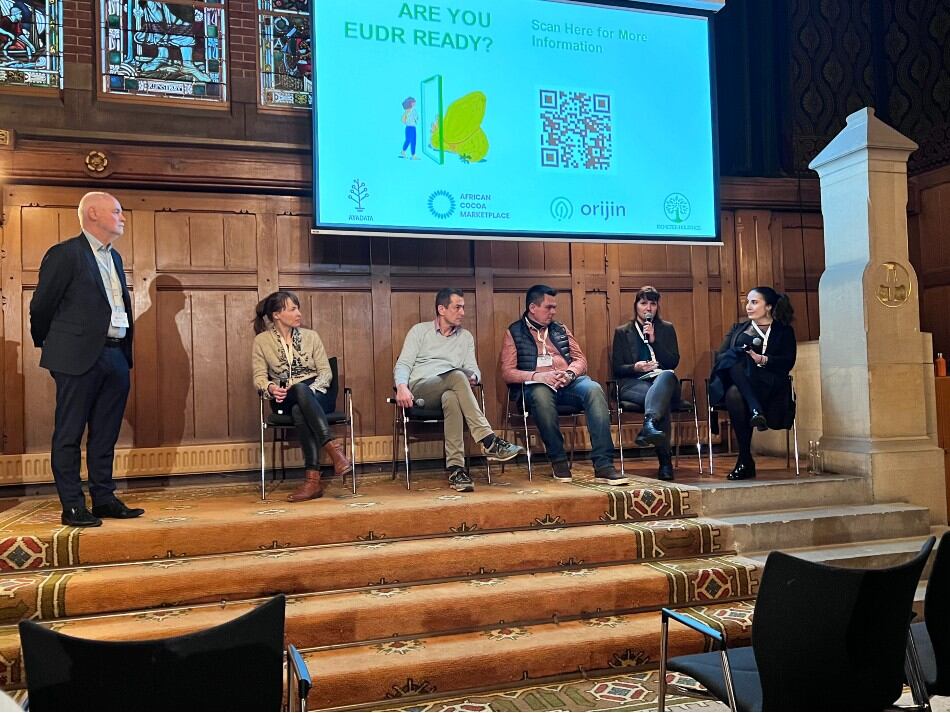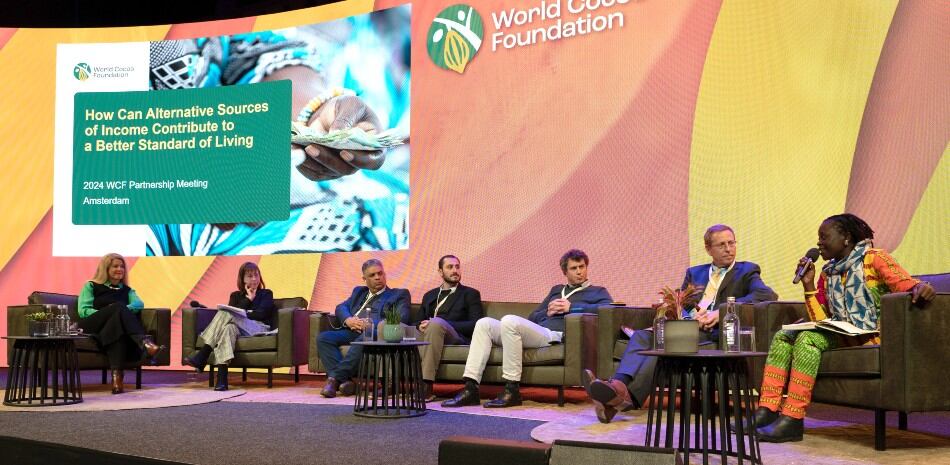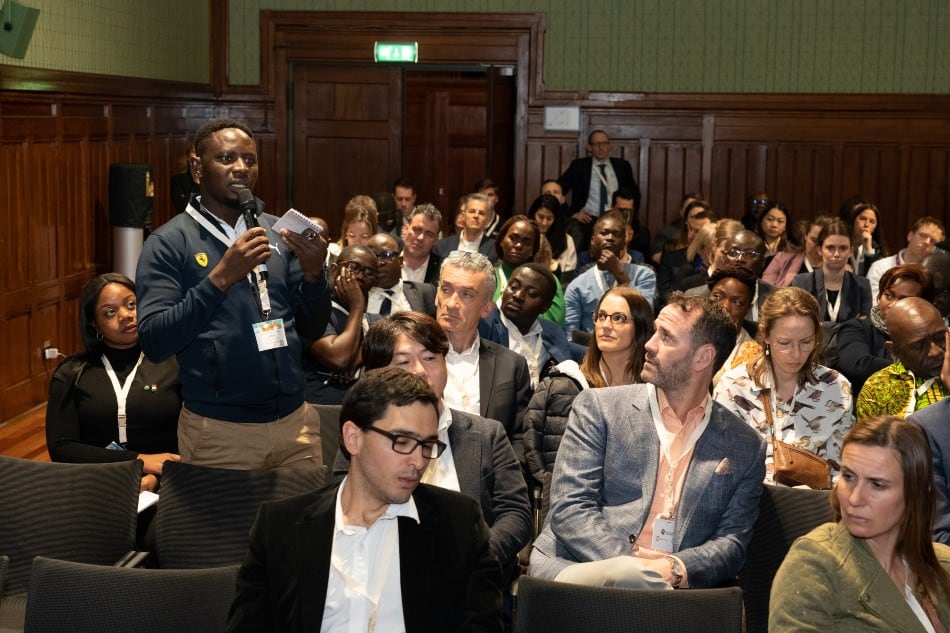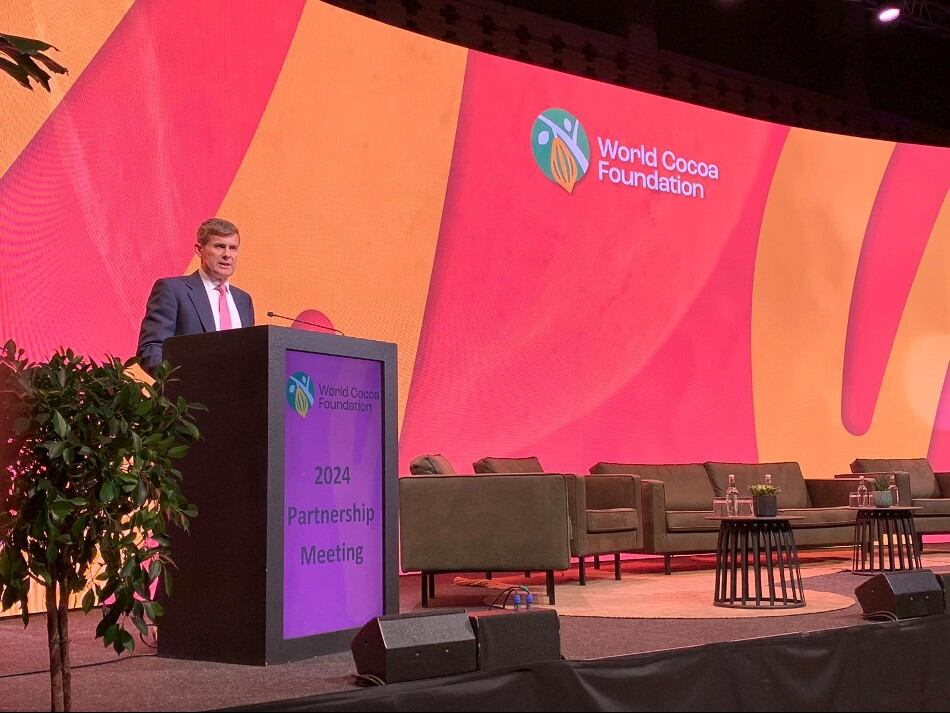On day one (Thursday, 8 February), the meetings proved more intimate, nuanced, and focussed after the WCF scoped out many of the wider issues during its two-day partnership meeting. The two gatherings came together under the auspices of Amsterdam Cocoa Week. Usually, the two are months apart in the calendar, but the organisers were clearly happy with the format as both events attracted near-sell-out registrations.
At the Amsterdam Sustainable Cocoa Conference, there were familiar faces from earlier in the week and a fresh influx of speakers and attendees that gave the event fresh impetus. Michel Arrion, executive director of the ICCO, provided continuity by hosting the second of the farmer income trilogy talks. The first was held on Monday at the WCF meeting – and the third will be held at the World Cocoa Conference in Brussels in April.
Cash transfers
Thursday’s talk was about how different types of cash transfers can increase incomes and facilitate investments in sustainable livelihoods and looked at the latest insights from ongoing pilots such as the Nestlé Income Accelerator initiative, already covered by this publication in January.
Cash transfers are different from higher prices or premiums as they are delinked from cocoa production, Arrion explained, but should the sector promote them? The key takeaway was that, yes, cash transfers bring their own value and help reduce farmer poverty, but they should be seen as complementary income to what the farmer draws for his beans.
100WEEKS founder, and CEO, Jeroen de Lange, said that unconditional cash transfers can support women to become entrepreneurs in their own right when linked to training. There is also an argument that they encourage savings, reduce food insecurity and the payments are made to men and women separately via mobile banking technology.
It should also be noted that men invest the extra cash in cocoa or the farm while women, in general, invest in alternative income sources, said Rik Habraken, senior advisor at KIT Royal Tropical Institute. “It’s not a magic solution, but they do cause a ripple effect,” he said. “But for them to be truly effective, there needs to be more outside investment in the infrastructure to maximize cash transfers to the poorest households.”
Sarah-Franklin Schaar, Project Manager of Farmers Livelihood, Beyond Beans Foundation, said cash transfers can also influence motivation and that as an overall living income strategy, 50% of farmers are engaged in growing other commodities.
Tiffany Talsma, Team co-lead at Alliance Bioversity, said her organisation had seen a strong benefit to a conditional reward linked to cash transfers, such as improving environmental services such as water supplies, for example.
Arrion summed up the session by saying whether conditional or unconditional, cash transfers should not be a distraction to achieving a proper living income for farmers and that farm income diversification was another valuable proposition.
The port of Amsterdam
The morning commenced with opening remarks from Chocoa organizer Jack Steijn on the importance of a week-long cocoa gathering held in Amsterdam, with its 150 years of experience as a hub for commerce for the commodity.
Mark Hoolwerf from the Port of Amsterdam said the area has a unique “cocoa cluster” with trading offices, processing facilities, and warehouses from large multinationals including Cargill and Ecom Trading. Sustainability is also an important part of the port’s ecosystem, he said, and the Port of Amsterdam is also partnering with other port authorities, in Cote d’Ivoire for example, to advise on its operation.
Isabelle van Tol, head of trade development for the Dutch government, echoed the message from her ministerial colleagues this week, welcoming the EUDR but saying that governments and other stakeholders are not moving fast enough with their responsibilities to the environment and farmers. She called for more inventive thinking and that farming has to become more profitable for the farmers. But she noted there was an appetite for change within the sector, but “everyone has a role to play.”
European Union Deforestation Regulation (EUDR)
Picking up and running with the European Union Deforestation Regulation (EUDR) topic that dominated the WCF meeting earlier, Chocoa convened its own meeting on navigating the EU legislation, asking the question: as consumers, businesses, and policymakers, how can we collectively contribute to fostering a more ethical and environmentally conscious cocoa industry within the framework of EU legislation?
Attendees were looking for solutions and answers to the question, and the latter is perhaps more difficult to provide until the EU Commission releases more guidelines on the regulations. For now, there are too many ‘known unknowns’.
For solutions to comply with the new regulations, Salla Mankinen from solution provider Orijin said one of the main concerns, especially for the small-holder cocoa farmer, is cost. “You can use tools that are freely available or open source, without paying a lot of money. But then the advantage of using a solution provider is that all your data is going to be connected. So when you collect your polygon and the data at farm level, you can then trace it through the chain and validate it with the due diligence statement level.
“So that's the other advantage of using a solution provider - because especially with these polygons and GPS coordinates that we now have, a lot of companies have them but the quality of them is really low.”
She understood that within the regulations, farms under 4 hectares don’t need polygon mapping, a GPS coordinate should be enough. Mankinen said the risk assessment part of the legislation is “the trickiest bit”, and where there's the most unknown, still, even from the European Union side, is …” that its seems that they're not quite clear on what constitutes a sufficient risk assessment.”
She said data quality is going to be key, but the problem with higher-quality data sets is that they're very expensive. So it means that they might be out of reach for a lot of the operators, and that's going to be a another problem.”
She told delegates that she hoped that theEU is going to be able to provide some help on this front and provide a good enough reference data set for the industry, “because on the other side of the picture, there's also the people who are going to be checking and verifying this information and they also need to be doing the same risk assessment as we do when they check for our due diligence.”
On a more positive note, she said her company had received a copy of the Due Diligence Statement the EU intends to use and it looks like quite a simple process for operators to fill in when submitting goods, in this case, cocoa, on the European market. “literally all you need to do is put the GPS coordinates for the batch that you're trying to import. And it's actually quite simple and straightforward, and at that point, you don't need to provide the risk assessment, but the European Union is going to verify those due diligence statements on the basis of the general risk level of the country.”
Risk assessment
María Salvadora Jiménez Rojas - Specialist in Fine Flavour Cocoa at trading house Daarnhouwer, said one of her main concerns was the risk assessment factor – low, standard, high, depending on where the cocoa comes from, and she was waiting for more clarity from the EU; meanwhile there were other concerns such as costs, time frame, and liability, that will need to be resolved before the regulations come in at the end of the year.
Adeline Dontenville from the European Forest Institute said obtaining polygon mapping is still a challenge and urged operators to form a collective action to engage with regulators. “Operators should use the best data available to them and cross-check with national maps,” she advised
Can the EUDR have a negative impact? Yes, according to Bruno Lasivicius, a cocoa farmer who produces fine bean-to-bar chocolate under the Casa Lasivicius brand. He called on the EU to consider the unique challenges of the farmers and that the EUDR may negatively impact small producers in Brazil by denying them access to the lucrative EU market.




